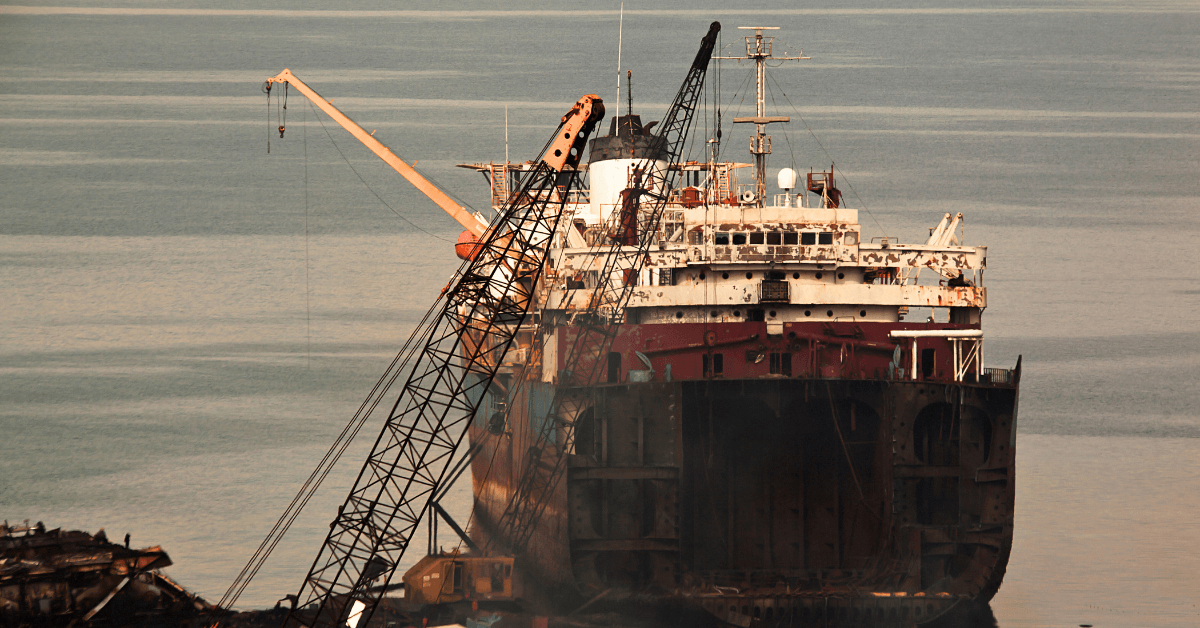
Saudi Arabia Signs $586 Million Deals To Privatise Cargo Terminals At 8 Ports
June 27, 2025
India’s Mazagon Dock To Buy Controlling Stake In Sri Lanka’s Largest Dockyard
June 28, 2025

Ship recycling is expected to more than double in the next ten years, with approximately 16,000 ships, or 700 million deadweight tonnes (DWT), estimated to be dismantled globally.
This significant increase follows the official enforcement of the Hong Kong International Convention for the Safe and Environmentally Sound Recycling of Ships, which came into force on June 26.
The new estimate by BIMCO, a leading global shipping association, is up from a previous projection of 15,000 ships. It represents nearly twice the number of ships, and almost three times the tonnage, recycled over the last decade.
According to BIMCO’s Chief Shipping Analyst, Niels Rasmussen, this signals an urgent need for more investments in ship recycling yards that meet international safety and environmental standards.
The estimate was based on recycling patterns between 2000 and 2019, applying average recycling rates by vessel type and age. For example, if 10% of 20-year-old capesize bulk carriers were dismantled during that period, BIMCO expects the same pattern over the next decade.
Ships built in the 2000s are expected to dominate scrapping activity moving forward. During 2015–2024, vessels constructed in the 1990s made up 35% of scrapped ships and 62% of DWT recycled.
However, shipbuilding grew substantially in the 2000s, with 31% more ships produced and a 115% increase in tonnage. Despite this, only 3% of those ships and 5% of their DWT have been recycled so far, compared to 20% of ships and 67% of DWT built in the 1990s.
While bulk carriers, tankers, and container ships will make up the majority of scrapped tonnage, around 91%, they account for just over half of the total number of vessels. The remaining will include general cargo vessels and fishing boats, each expected to contribute numbers close to the larger sectors.
From 2015 to 2024, most ship recycling took place in South Asia. Bangladesh, India, and Pakistan handled 86% of recycled DWT and 58% of vessels. Their dominance grew even stronger after 2017, when China exited international ship recycling.
Since then, China has scrapped less than 2% of global DWT. Outside South Asia, Turkey remains a notable location, especially for dismantling offshore vessels.
Despite some projects to expand shipbreaking capacity in other regions, BIMCO believes South Asia will remain the primary hub for the foreseeable future.
The previous record for ship recycling occurred in 2012, with about 1,800 ships and 60 million DWT dismantled. Starting in 2027, annual recycling volumes could surpass that record each year, given the large number of aging ships and tighter environmental policies.
However, the actual number could vary depending on market dynamics. BIMCO stated that if the shipping market remains strong, recycling might fall below projections. On the other hand, weak markets or increased pressure to cut emissions may push scrapping levels even higher.
The Hong Kong Convention is key to this shift, setting mandatory rules for how ships must be dismantled at the end of their service. The Convention aims to protect both the environment and the workers involved in shipbreaking. It took effect on June 26 after years of preparation, with 24 countries having ratified it.
These include key ship recycling nations such as Bangladesh, India, Pakistan, and Türkiye, along with major ship registry nations like Japan, Liberia, Panama, and the Marshall Islands. Collectively, these countries represent over 57% of the world’s shipping by tonnage.
Responding to the Convention’s enforcement, Pakistan’s federal maritime minister, Junaid Anwar Chaudhry, chaired a meeting on upgrading the Gadani Ship Breaking Yard. The minister announced a 12-billion rupee plan to turn Gadani into a Model Green Yard, featuring modern infrastructure and eco-friendly practices.
The project also includes a 30-bed hospital, 32-kilometer road, housing for doctors and nurses, a school, park, clean drinking water, and a labor colony.
The modernisation effort began in September 2024 during a visit by International Maritime Organization (IMO) Secretary-General Arsenio Dominguez, who launched the initiative.
The IMO sees the enforcement of the Hong Kong Convention as a historic moment. Dominguez stated that the move represents years of hard work and will boost global efforts to safeguard both human health and the environment during ship recycling.
NGO Shipbreaking Platform, which tracks safety and environmental issues in the industry, has raised concerns. The group reports that since 2009, around 8,221 ships were scrapped in South Asia, leading to at least 473 worker deaths and 517 injuries. The organisation believes these numbers are underreported, as occupational diseases are not recorded and official monitoring remains weak.
In a recent publication, the group criticised the Convention for failing to address environmental justice and human rights. According to Ingvild Jenssen, the NGO’s executive director, the Convention benefits shipping companies more than workers, by allowing them to avoid the full cost of safe and sustainable recycling. She also warned that it could undermine competition by disadvantaging responsible recyclers who operate at higher safety standards.
Still, the Convention’s supporters argue that it brings long-overdue structure to a dangerous and often poorly regulated industry.
Reference: BIMCO
Source: Maritime Shipping News


